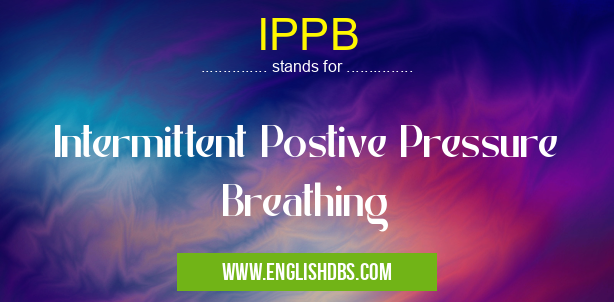What does IPPB mean in UNCLASSIFIED
Intermittent Positive Pressure Breathing (IPPB) is an advanced form of respiratory therapy used to treat various pulmonary disorders, such as chronic obstructive pulmonary disease (COPD), asthma, and cystic fibrosis. This type of therapy involves using a device that delivers regulated levels of air pressure to the lungs, helping to expand the airways, promote improved ventilation, and reduce episodes of breathlessness and wheezing. IPPB can be used in both acute and chronic settings, providing patients with increased comfort, improved breathing capacity, and reduced hospital stays.

IPPB meaning in Unclassified in Miscellaneous
IPPB mostly used in an acronym Unclassified in Category Miscellaneous that means Intermittent Postive Pressure Breathing
Shorthand: IPPB,
Full Form: Intermittent Postive Pressure Breathing
For more information of "Intermittent Postive Pressure Breathing", see the section below.
What is IPPB?
IPPB consists of a small machine that pumps regulated amounts of air or oxygen into a special mask worn by the patient. The air pressure is adjusted depending on the needs of the patient, with higher pressures being utilized for acute episodes or conditions where rapid improvement is needed. The machine also uses expiratory positive pressure (EPP) to help dislodge secretions from the lungs during exhalation, assisting in the removal of mucus plugging caused by COPD flare-ups or other forms of bronchitis. The combination of positive pressure delivered by IPPB helps improve lung function and gas exchange in severely ill patients.
Benefits
Patients who receive IPPB enjoy multiple benefits due to its ability to rapidly improve their respiratory functions. This type of therapy may result in more efficient breathing patterns and improved airflow throughout the lungs. It can also help to reduce “air trapping†caused by COPD or other medical conditions that interfere with normal respiration. In cases where oxygen supplementation is required, IPPB helps deliver oxygen directly into the lungs rather than through supplemental devices like nasal cannulas or face masks. As a result, patients experience better quality sleep and more energy overall during their recovery period.
Risks
Although IPPB offers many potential benefits for severely ill patients who need it most, there are some risks involved that should be considered before deciding if this treatment is right for you. Common side effects include headache, nausea/vomiting, dizziness or lightheadedness as well as facial skin irritation from prolonged use of a mask or face shield accompanying certain types of machines used for this procedure. Additionally, some medications associated with this type of therapy may cause allergic reactions or interact adversely with existing medications already being taken by a patient.
Essential Questions and Answers on Intermittent Postive Pressure Breathing in "MISCELLANEOUS»UNFILED"
Intermittent Positive Pressure Breathing (IPPB) offers many advantages over traditional treatments when it comes to improving respiratory function in patients suffering from severe pulmonary disorders such COPD and asthma. It can provide immediate relief from breathlessness as well as improve sleep quality at night due to its targeted delivery mechanism for oxygen supplementation when needed. Although there are some risks associated with this type treatment that should be discussed with your doctor beforehand, IPPB may prove to be an invaluable tool in managing pulmonary diseases and improving overall health outcomes in those affected by them.
